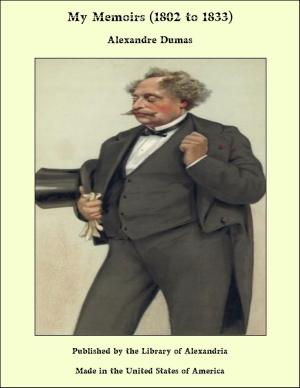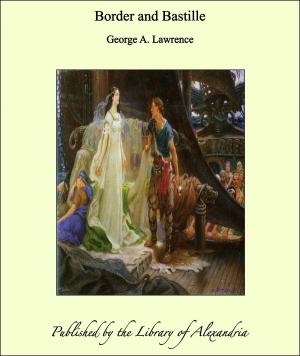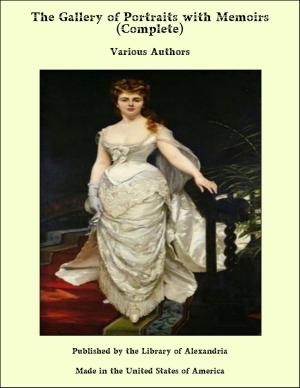The Life of Gordon (Complete)
Nonfiction, Religion & Spirituality, New Age, History, Fiction & Literature| Author: | Demetrius Charles Boulger | ISBN: | 9781465530318 |
| Publisher: | Library of Alexandria | Publication: | March 8, 2015 |
| Imprint: | Language: | English |
| Author: | Demetrius Charles Boulger |
| ISBN: | 9781465530318 |
| Publisher: | Library of Alexandria |
| Publication: | March 8, 2015 |
| Imprint: | |
| Language: | English |
As so many books of a more or less biographical nature have been written about General Charles Gordon, it is both appropriate and natural that I should preface the following pages with a statement of a personal character as to how and why I have written another. In the year 1881 I told General Gordon that I contemplated describing his career as soon as I had finished writing my "History of China." His laughing reply was: "You know I shall never read it, but you can have all my papers now in the possession of my brother, Sir Henry Gordon." My history took a very long time to write, and the third volume was not published until April 1884, when General Gordon was hemmed in, to use his own words, at Khartoum. For over two years General Gordon's papers and letters remained in my custody, and they included the Equator and Soudan correspondence, which was so admirably edited by Dr Birkbeck Hill in that intensely interesting volume, "Colonel Gordon in Central Africa." The papers relating to China and the Taeping Rebellion were freely used in my history. To them I have the privilege of adding in the present volume an authoritative narrative of the events that followed the execution of the Taeping Wangs at Soochow, and of thus rendering tardy justice to the part taken in them by Sir Halliday Macartney. Among the contents of the large portmanteau in which all these documents were stored, I noticed a thick bundle of letters, in somewhat faded handwriting, and an examination of their contents showed me that they were of the deepest interest as relating to the important events of the Crimean War, and to the first seven years of Gordon's service in the Army. I at once went to Sir Henry Gordon, who honoured me with his friendship and confidence in no less a degree than his distinguished and ever-lamented brother, and begged of him permission to publish them. He at once gave his consent, which was ratified by the late Miss Augusta Gordon, the hero's favourite sister. The letters appeared in July 1884, under the title of "General Gordon's Letters from the Crimea, the Danube, and Armenia." In the proper place I have told what Kinglake, the historian of the war, thought of them and their author. In the rush of books that followed the fall of Khartoum, no favourable opportunity for carrying out my original purpose presented itself; and, indeed, I may say that the anonymous biographical work I performed during the course of the year 1885 would have filled a large-sized volume. Moreover, the terrible events of the fall of Khartoum, and the failure of the relieving expedition, were too close at hand to allow of a just view being taken of them, and it was necessary to defer an intention which I never abandoned. It seemed to me that the tenth anniversary of the fall of Khartoum would be an appropriate occasion for the appearance of a Life claiming to give a complete view and final verdict on the remarkable career and character of the man, with whom his own friendly inclination had made me exceptionally well acquainted
As so many books of a more or less biographical nature have been written about General Charles Gordon, it is both appropriate and natural that I should preface the following pages with a statement of a personal character as to how and why I have written another. In the year 1881 I told General Gordon that I contemplated describing his career as soon as I had finished writing my "History of China." His laughing reply was: "You know I shall never read it, but you can have all my papers now in the possession of my brother, Sir Henry Gordon." My history took a very long time to write, and the third volume was not published until April 1884, when General Gordon was hemmed in, to use his own words, at Khartoum. For over two years General Gordon's papers and letters remained in my custody, and they included the Equator and Soudan correspondence, which was so admirably edited by Dr Birkbeck Hill in that intensely interesting volume, "Colonel Gordon in Central Africa." The papers relating to China and the Taeping Rebellion were freely used in my history. To them I have the privilege of adding in the present volume an authoritative narrative of the events that followed the execution of the Taeping Wangs at Soochow, and of thus rendering tardy justice to the part taken in them by Sir Halliday Macartney. Among the contents of the large portmanteau in which all these documents were stored, I noticed a thick bundle of letters, in somewhat faded handwriting, and an examination of their contents showed me that they were of the deepest interest as relating to the important events of the Crimean War, and to the first seven years of Gordon's service in the Army. I at once went to Sir Henry Gordon, who honoured me with his friendship and confidence in no less a degree than his distinguished and ever-lamented brother, and begged of him permission to publish them. He at once gave his consent, which was ratified by the late Miss Augusta Gordon, the hero's favourite sister. The letters appeared in July 1884, under the title of "General Gordon's Letters from the Crimea, the Danube, and Armenia." In the proper place I have told what Kinglake, the historian of the war, thought of them and their author. In the rush of books that followed the fall of Khartoum, no favourable opportunity for carrying out my original purpose presented itself; and, indeed, I may say that the anonymous biographical work I performed during the course of the year 1885 would have filled a large-sized volume. Moreover, the terrible events of the fall of Khartoum, and the failure of the relieving expedition, were too close at hand to allow of a just view being taken of them, and it was necessary to defer an intention which I never abandoned. It seemed to me that the tenth anniversary of the fall of Khartoum would be an appropriate occasion for the appearance of a Life claiming to give a complete view and final verdict on the remarkable career and character of the man, with whom his own friendly inclination had made me exceptionally well acquainted















